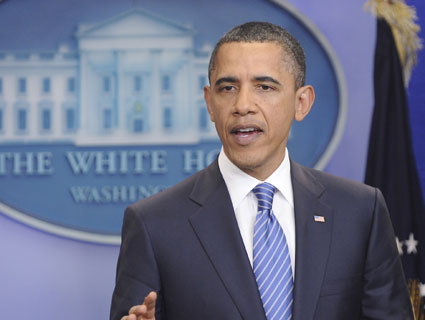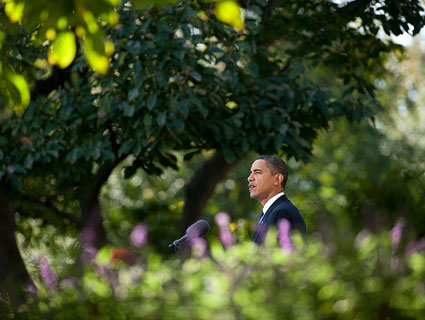President Obama has to pull off a tricky balancing act in his 2012 re-election fight: wooing independents without alienating his liberal base. His strategy was on full display this week as he dove into the battle over the deficit. On the one hand, Obama embraced the Republican idea that cutting the deficit should be a top priority—falling into a trap that the House GOP set last week when it rolled out Rep. Paul Ryan’s drastic budget proposal. On the other hand, Obama tacked left in his speech on Wednesday by making a vigorous defense of government entitlements and insisting that savings must come from elsewhere.
There’s one group, though, that doesn’t seem to be playing a big part in Obama’s strategy: Congressional Democrats, particularly House Dems who’ve been sidelined in the minority. Obama is charging ahead with his deficit message this week without so much as giving a heads up to his allies in Congress. House Leader Nancy Pelosi—who’s been persona non grata since the beginning of the new Congress—expressed her frustration to White House adviser Gene Sperling in a private meeting on Thursday. “Maybe you could consult with us just once,” Pelosi told Sperling, according to Politico.
Other House Dems expressed similar sentiments after Obama surprised them with the news that he was planning a major speech on the deficit. “He sprung it on us,” Rep. Jim McDermott (D-Wash.) told Mother Jones on Monday night. “When you’re going into something like this, my view is that you want to have as many on your side as—I would have laid the groundwork a little.”
Politically speaking, Obama seems to believe it’s in his best interest to distance himself from Pelosi and House Democrats. They represent the more liberal wing of his party in Congress and made the final push to pass the still-unpopular Affordable Care Act. The president may believe that by keeping his distance, he can better control his image and gain the flexibility to shore up his liberal bona fides or tack to the center depending on the circumstances.
But in bypassing Democratic leaders, Obama also runs the risk of ceding ground to Republicans in the few legislative deals that must be made before his re-election. House Democratic leaders have already been struggling to keep up with Obama’s rope-a-dope, paying lip service to the decidedly centrist Bowles-Simpson deficit plan while distancing themselves from its most controversial elements.
Now the White House is planning to go over the head of Congress yet again by convening a working group to issue recommendations on the deficit, whose work will happen in the midst of the upcoming fight over the debt limit. Pelosi warned that pushing out such concrete proposals right before the vote could embolden Republicans to ask for major concessions in exchange for raising the debt limit. Such a sequence of events may help Obama win over centrist voters in 2012. But it could hurt Hill Democrats who need to pass legislation in 2011.















